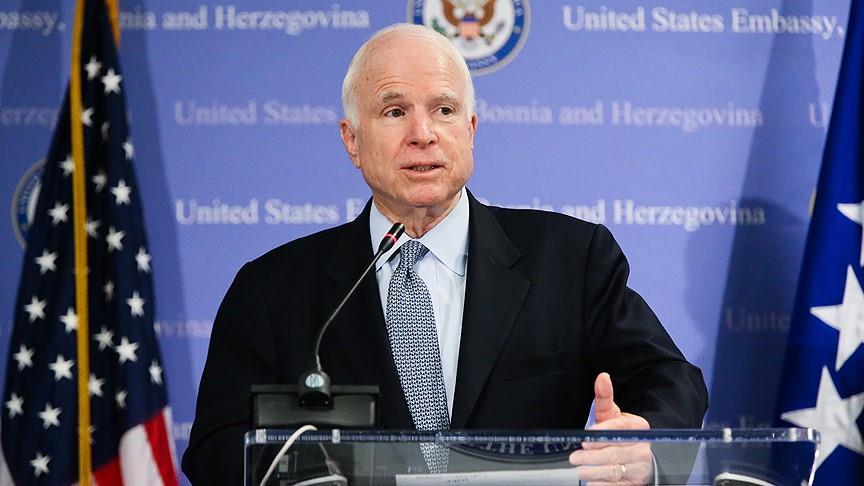No change in US Kashmir policy: US' McCain
US senators visit Pakistan to soothe Islamabad's ire over designation of Kashmiri leader as 'global terrorist'
 FILE PHOTO - John McCain
FILE PHOTO - John McCain
By Aamir Latif
KARACHI, Pakistan
Senator John McCain, chairman of the U.S. Senate's Armed Services Committee, Sunday said there was no change in Washington's Kashmir policy despite the designation last week of a key pro-freedom Kashmiri leader as a "global terrorist".
According to Pakistan's Foreign Ministry, McCain, leading a five-senator delegation in the capital Islamabad, made the remarks during a meeting with Pakistani foreign policy adviser Sartaj Aziz.
"There is no change in U.S. policy on Kashmir. The U.S. will continue to pursue its [traditional] Kashmir policy", McCain was quoted as saying by state-run Pakistan Television, citing Foreign Ministry officials.
McCain's remarks followed a U.S. State Department spokesperson on Saturday declaring, "Our Kashmir policy has not changed".
Aziz, who serves as de facto foreign minister, reiterated his country's position, saying, "Pakistan firmly believes in the legitimacy of the Kashmir cause and the peaceful struggle of the Kashmiri people to claim the right to self-determination promised to them by the international community through the UN Security Council resolutions".
On June 26, hours before the first-ever meeting between U.S. President Donald Trump and Indian Prime Minister Narendra Modi at the White House, Washington declared Syed Sallahuddin, the head of Hizb-ul-Mujahddin -- the largest armed group fighting Indian occupation of Kashmir -- a global terrorist.
The move instantly invited ire from Islamabad, which rejected the U.S. decision, saying the 70-year-old indigenous struggle of Kashmiris in Indian-occupied Jammu and Kashmir remains legitimate.
Many see the U.S. senators' visit as an attempt to ease escalating tensions between the two close allies in the so-called war on terror following Washington's latest move.
Aziz also warned on Saturday that his country's relations with the U.S. could be affected following the designation of Sallahuddin as a terrorist.
The State Department designation accused Sallahuddin of blocking “peaceful resolution” of the conflict of Kashmir, and of threatening to turn the valley into "a graveyard of Indian forces".
- Afghanistan
McCain also sought Pakistan's assistance to resolve the lingering Afghanistan conflict, saying that peace in the war-torn country was not "possible" without Islamabad's help.
"Pakistan's role for peace and stability in Afghanistan is crucial", McCain was further quoted as saying by Pakistan television.
Afghanistan and Pakistan have had a rocky relationship in the last few years, with both sides accusing each other of patronizing certain Taliban groups on their soil.
Islamabad had brokered a landmark peace dialogue between the Afghan government and the Taliban near Islamabad in July 2015, but the leak of news of the death of the Taliban's founding supreme leader Mullah Omer, and the subsequent death of his successor Mullah Akhtar Mansur in a U.S. drone strike in 2016, damaged the already fragile trust between the two sides.
Since then, several attempts have been made to bring the two sides to the table, but to no avail.
Kabul accuses Islamabad of not using its reported influence to bring the Afghan Taliban back to the talks. Pakistan, for its part, says it does have a degree of influence over the Afghan Taliban but it alone could not force them to negotiate with the Kabul government.
Anadolu Agency website contains only a portion of the news stories offered to subscribers in the AA News Broadcasting System (HAS), and in summarized form. Please contact us for subscription options.







